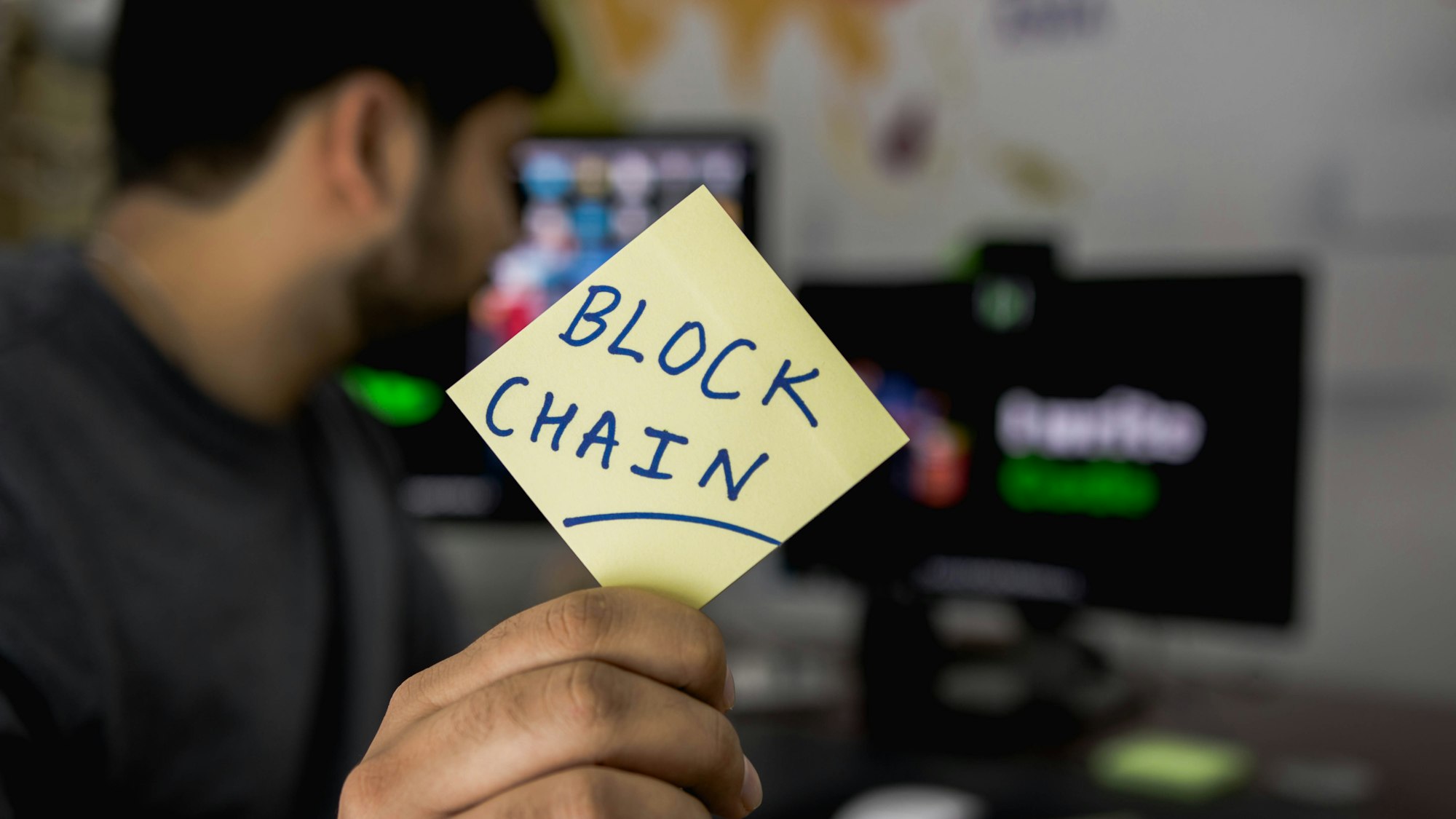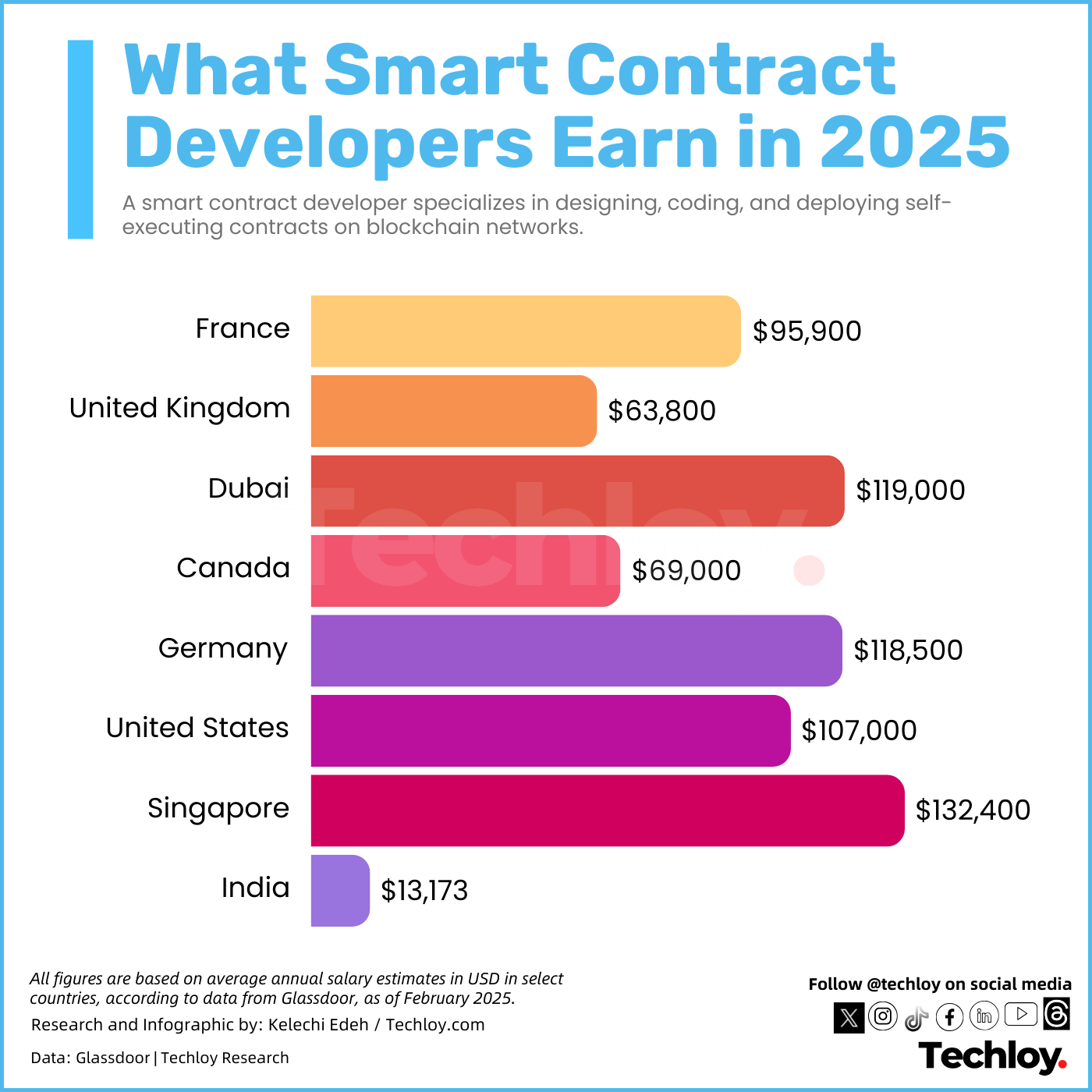The complete guide to help you become a Smart Contract Developer in 2025
This guide breaks down the skills, tools, salary and insider strategies you need to stand out in this fast-moving field.

Smart contracts are self-executing digital agreements that run on blockchain networks, ensuring secure, automated transactions without intermediaries.
They are the backbone of decentralized applications (DApps), powering sectors like finance, gaming, and supply chain management. As blockchain adoption grows, the demand for smart contract developers continues to surge, making this a lucrative and future-proof career path.
Whether you're transitioning from traditional software development or starting fresh, this guide will help you understand what it takes to become a smart contract developer in 2025 and establish yourself in this evolving field.

Who is a Smart Contract Developer?
A smart contract developer specializes in designing, coding, and deploying self-executing contracts on blockchain networks. Unlike traditional developers, their work revolves around blockchain-based automation, eliminating the need for third-party verification.
They create contracts that facilitate secure transactions, enforce agreements, and power decentralized applications. This role requires a deep understanding of blockchain protocols, Solidity programming, security best practices, and gas optimization.
Freelance vs. In-House Smart Contract Developers
- Freelance developers build blockchain-based solutions for multiple clients, often working on DeFi, NFTs, and enterprise blockchain projects. They enjoy flexibility and potentially higher earnings.
- In-house developers work for blockchain startups, fintech firms, or enterprise companies, focusing on secure smart contract implementation and long-term system maintenance.
Both career paths offer significant opportunities, depending on your preferences for stability or independence.
How Much Does a Smart Contract Developer Earn?
Salaries vary based on expertise, experience, and the blockchain ecosystem you work in. Here’s a general breakdown:
- Entry-level (0-2 years): $80,000 – $120,000 annually
- Mid-level (3-5 years): $120,000 – $180,000 annually
- Senior-level (5+ years, blockchain specialists): $180,000 – $300,000+ annually
Blockchain hubs like San Francisco, London, Singapore, and Dubai offer some of the highest-paying roles, while remote opportunities remain strong due to the global nature of blockchain development.

Role of a Smart Contract Developer
Smart contract developers play a critical role in decentralized ecosystems, ensuring that blockchain applications run smoothly and securely. Their responsibilities include:
- Developing and Auditing Smart Contracts – Writing secure Solidity-based contracts and ensuring they function as expected.
- Optimizing Gas Fees – Reducing transaction costs on Ethereum and other blockchains.
- Deploying Contracts on Testnets & Mainnets – Ensuring proper execution in live environments.
- Integrating Smart Contracts with DApps – Connecting contracts with front-end interfaces through Web3 libraries.
- Ensuring Blockchain Security – Implementing best practices to protect against vulnerabilities like reentrancy attacks and integer overflows.
- Contributing to Open Source Protocols – Enhancing existing blockchain networks and frameworks.
Skills Needed to Become a Smart Contract Developer
You need a blend of technical and soft skills to excel in this role:
Technical skills
- Programming languages: Proficiency in Solidity, with knowledge of JavaScript, Python, or Rust for full-stack development.
- Blockchain fundamentals: Understanding consensus mechanisms, Ethereum Virtual Machine (EVM), and decentralized storage.
- Development tools: Familiarity with Truffle, Hardhat, and Remix IDE.
- Security best practices: Knowledge of smart contract vulnerabilities and auditing techniques.
- Web3 & DApp development: Experience with libraries like Web3.js, Ethers.js, and IPFS.
Soft Skills
- Problem-solving: Critical thinking to handle smart contract complexities.
- Attention to detail: Ensuring flawless execution in blockchain-based agreements.
- Collaboration & communication: Working with blockchain engineers, security auditors, and DApp developers.
Roadmap to Becoming a Smart Contract Developer
Here's a step-by-step playbook to getting started in this role:
/1. Build a strong foundation in blockchain and smart contracts
The journey begins with understanding the fundamentals of blockchain technology. You need to grasp concepts like distributed ledgers, consensus mechanisms, and the role of nodes in blockchain networks. Ethereum remains the most popular platform for smart contracts, so exploring its structure—especially the Ethereum Virtual Machine (EVM)—is key. Resources like the Ethereum documentation and blockchain courses on Coursera provide a strong starting point.
Once you have a theoretical grasp, the next step is learning Solidity, the primary programming language for writing smart contracts. Solidity’s syntax is similar to JavaScript and Python, making it accessible for developers familiar with these languages. Platforms like CryptoZombies and Solidity by Example offer interactive tutorials to help you practice writing and deploying contracts.
/2. Get Hands-On with Smart Contract Development
The best way to learn is by building real projects. Start by setting up a development environment using Remix IDE for basic contracts, then transition to Hardhat or Truffle for more advanced projects. Deploying contracts on testnets like Rinkeby or Goerli will give you real-world experience before interacting with live blockchain networks.
At this stage, you should also explore gas optimization techniques to make your contracts efficient and cost-effective. Understanding storage variables, loops, and execution costs is crucial for working within blockchain’s resource constraints.
/3. Master Web3 integration & full-stack DApp development
A smart contract is just one piece of the puzzle—it needs to interact with applications and users. Learning Web3.js or Ethers.js enables you to connect smart contracts with front-end applications. You should also familiarize yourself with React.js or Next.js to build user interfaces that interact with the blockchain.
A great beginner project is developing a decentralized voting system or a simple NFT marketplace. These projects will give you practical experience in deploying contracts, handling user transactions, and managing blockchain interactions.
/4. Learn smart contract security & auditing
Security is one of the most critical aspects of smart contract development. Exploits like reentrancy attacks, overflow vulnerabilities, and faulty access control can lead to millions in losses. Studying real-world hacks, such as the DAO attack and the Wormhole exploit, will teach you the importance of rigorous auditing.
Learning how to use tools like MythX, Slither, and OpenZeppelin’s security libraries will help you write secure, audit-ready contracts. Participating in Capture the Flag (CTF) security challenges for smart contracts can also sharpen your skills.
/5. Build a portfolio & contribute to open source
Employers and clients want proof of your abilities. Hosting your projects on GitHub or creating a profile on platforms like Ethereum’s Stack Exchange will boost your credibility. Consider contributing to open-source blockchain projects or participating in hackathons like ETHGlobal and Gitcoin bounties to network with industry professionals.
Writing technical blogs on Medium or dev.to about your learning journey can also help establish your expertise in the field. Employers appreciate developers who actively share knowledge and contribute to the blockchain community.
/6. Land your first smart contract developer job or freelance gig
Once you’ve built a strong portfolio, it’s time to start applying for jobs. Platforms like CryptoJobsList, Web3 Careers, and LinkedIn frequently list blockchain development roles. If you prefer freelancing, sites like Toptal, Upwork, and CoderHub offer opportunities for smart contract projects.
Networking is key—attend blockchain meetups, conferences, and Twitter Spaces to connect with industry professionals. Many Web3 job opportunities arise from community engagement rather than traditional applications.
Conclusion
Becoming a smart contract developer in 2025 is an exciting and rewarding career move, but it requires continuous learning, hands-on development, and strong security awareness. By mastering Solidity, Web3, and blockchain security, you position yourself at the forefront of the decentralized revolution. Whether you aim to join a blockchain startup, contribute to open-source projects, or freelance, the demand for smart contract expertise is only growing.
Start coding, build projects, engage with the Web3 community, and take the first steps toward a thriving career in smart contract development today!






